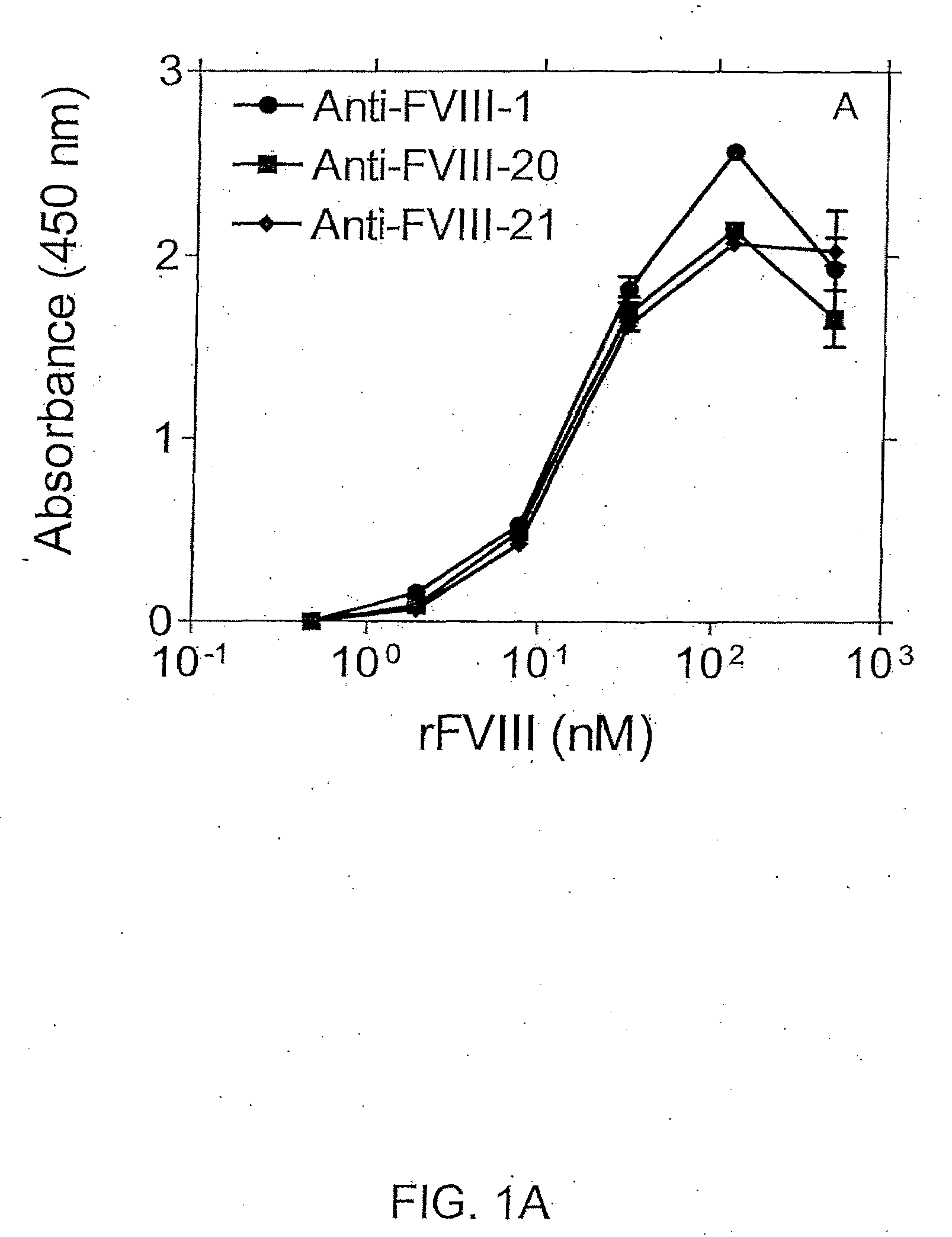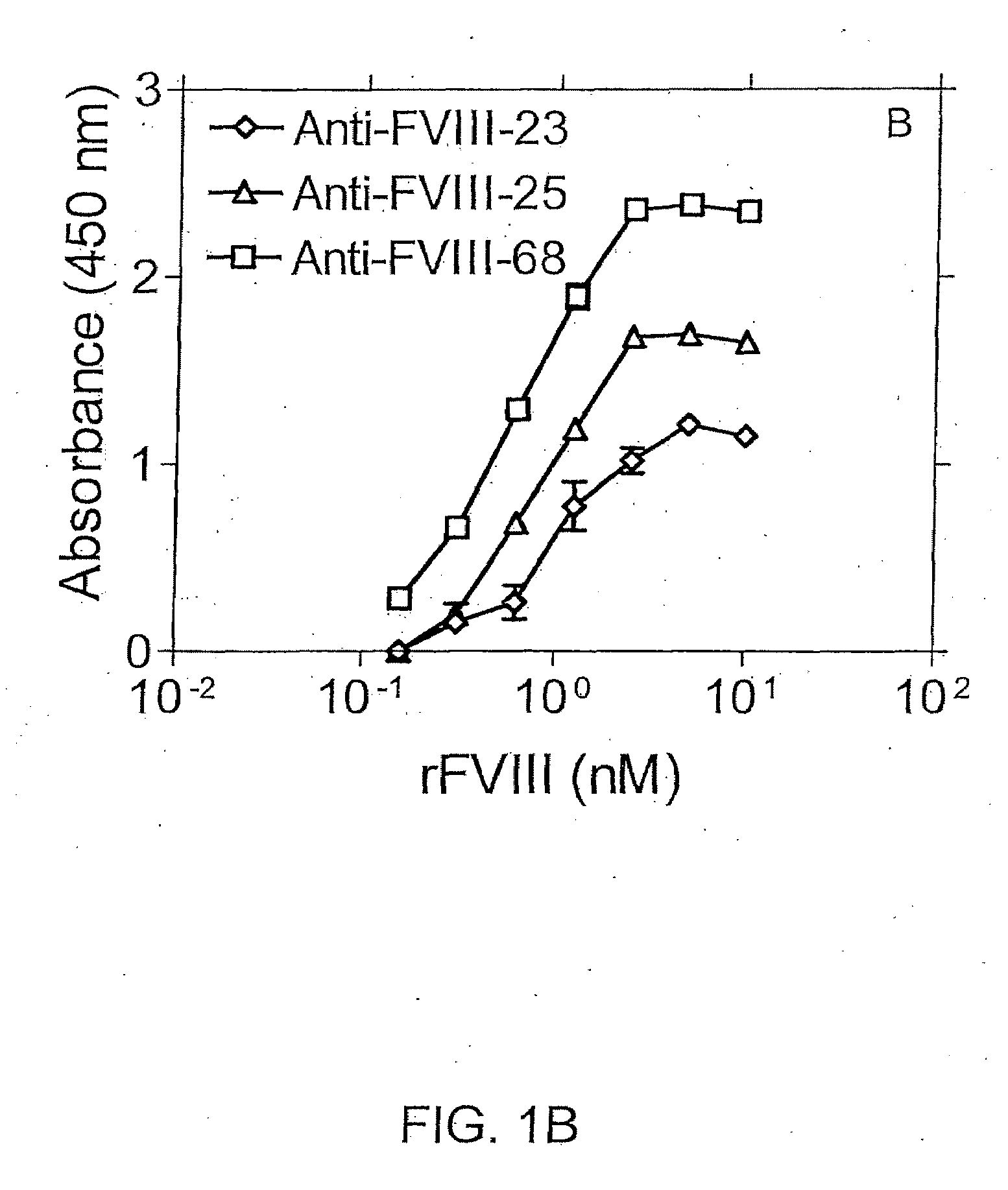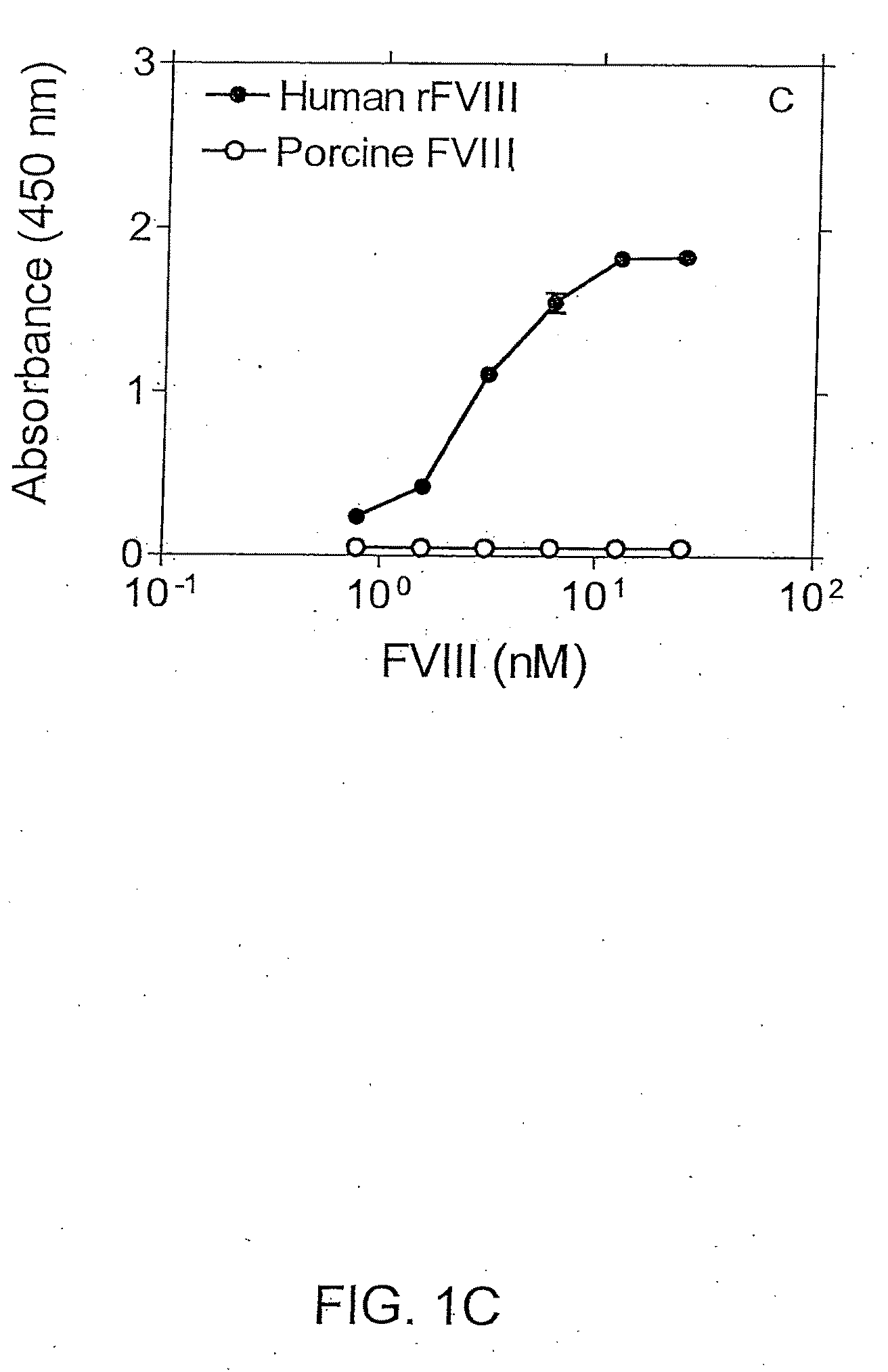Highly Sensitive Immunoassays and Antibodies for Detection of Blood Factor VIII
a technology of immunoassays and antibodies, applied in the field of high-sensitivity immunoassays and antibodies for detection can solve the problems of unstable human factor viii at physiologic concentration and ph, extremely low concentration of blood factor viii, and serious symptoms, and achieve enhanced assay sensitivity, accurate detection of fviii concentration, and high affinity and selectivity.
- Summary
- Abstract
- Description
- Claims
- Application Information
AI Technical Summary
Benefits of technology
Problems solved by technology
Method used
Image
Examples
example 1
Materials and Methods
[0092]The following materials and methods were used as needed to conduct studies outlined in Examples 1-10. Additional methodological details are included in Examples 11 and 12.
[0093]1. Proteins
[0094]Albumin-free rFVIII was used as our gold standard in all immunoassays and activity assays), Recombinate® (albumin-stabilized rFVIII), Hemofile-M® (plasma-derived, immunoaffinity purified vWF-containing FVIII), Immunate® (plasma-derived FVIII containing excess molar concentration of vWF), Refacto® (B-domain-deleted FVIII) and Kogenate (sucrose-stabilized rFVIII, Bayer Corporation, Elkhart, Ind.) were obtained from Baxter Healthcare Corporation, Westlake Village, Calif.). VWF (purified, MW of 250,000) was a generous gift from Dr. Rick Jenny, Haematologic Technologies Inc., Essex Junction, Vt.).
[0095]2. Production of FVIII- and vWF-Specific Monoclonal Antibodies (mAbs)
[0096]Balb / C mice were used for immunization with plasma purified FVIII and vWF. Immunization protocol...
example 2
Immunological Characterization of FVIII-Specific mAbs
[0108]Monoclonal antibodies against Factor VIII were prepared as described in Methods. From eighteen stable clones produced, six clones (designated M1 and M20-M25) were selected for further characterization. Immunological characteristics of these clones are shown in Table I. Immunological properties of anti-FVIII mAb clone 68 (F68, see Methods) is also included in the Table I. A hybridoma cell line designated αFVIII-68 producing mAb-68 was deposited on Jul. 28, 2005, under Accession Number PTA-6891, with the American Type Culture Collection (“ATCC”).
[0109]As shown in Table I, all FVIII clones exhibited apparent affinities in the range of 49-160 nM. Two clones (M1 and F68) could be used in immunoblotting for structural analysis of full-length FVIII and FVIII fragments, and for epitope mapping. Clone F68 binds to protein A; thus binding of this mAb to FVIII could be probed by both HRP-anti-mouse Ig and HRP-protein A.
TABLE IImmunolog...
example 3
Double Sandwich Immunoassays Comprising FVIII-Specific mAbs
[0110]In an exemplary double sandwich mAb assay, F(ab)′2 fragment from clone 24 was immobilized in the wells of microtiter plates. Binding of FVIII to mAb 24 was detected using different anti-FVIII-specific mAbs as shown in FIGS. 1A and 1B. More particularly, FIGS. 1A and 1B show immunoassays in which recombinant Factor VIII (rFVIII) was captured using anti-FVIII-24 mAb(Fab)′2 fragment. Binding of rFVIII was detected with one of the anti-Factor VIII mAbs as indicated, i.e., anti-FVIII-1, -20 and -21 mAbs (FIG. 1A) or anti-Factor VIII-23, 25, or -68 mAbs (FIG. 1B).
[0111]Binding specificity of anti-FVIII mAbs was confirmed using porcine FVIII as compared with human FVIII. A representative curve is shown in FIG. 1C in which binding of FVIII to immobilized anti-FVIII-24 (Fab)′2 was probed with anti-FVIII-20 mAb. Human or porcine FVIII bound to anti-FVIII-24 mAb (Fab)′2 fragment was probed with anti-FVIII-20 mAb and HRP-anti-mous...
PUM
| Property | Measurement | Unit |
|---|---|---|
| concentration | aaaaa | aaaaa |
| concentration | aaaaa | aaaaa |
| pH | aaaaa | aaaaa |
Abstract
Description
Claims
Application Information
 Login to View More
Login to View More - R&D
- Intellectual Property
- Life Sciences
- Materials
- Tech Scout
- Unparalleled Data Quality
- Higher Quality Content
- 60% Fewer Hallucinations
Browse by: Latest US Patents, China's latest patents, Technical Efficacy Thesaurus, Application Domain, Technology Topic, Popular Technical Reports.
© 2025 PatSnap. All rights reserved.Legal|Privacy policy|Modern Slavery Act Transparency Statement|Sitemap|About US| Contact US: help@patsnap.com



